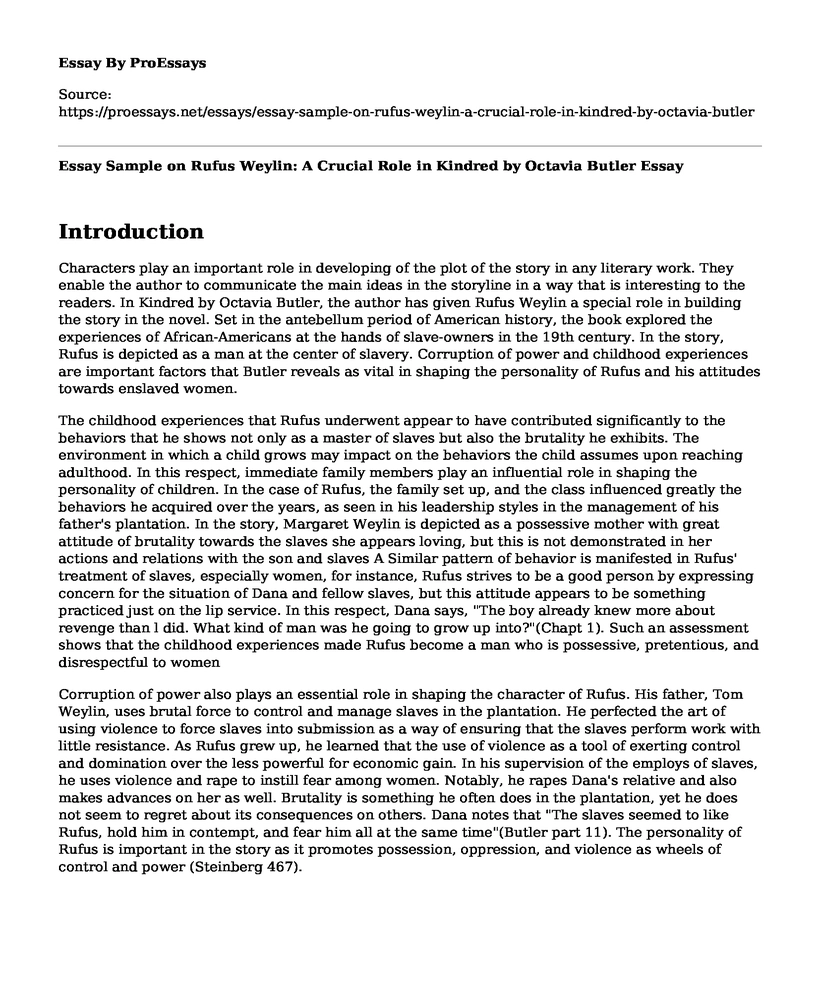Introduction
Characters play an important role in developing of the plot of the story in any literary work. They enable the author to communicate the main ideas in the storyline in a way that is interesting to the readers. In Kindred by Octavia Butler, the author has given Rufus Weylin a special role in building the story in the novel. Set in the antebellum period of American history, the book explored the experiences of African-Americans at the hands of slave-owners in the 19th century. In the story, Rufus is depicted as a man at the center of slavery. Corruption of power and childhood experiences are important factors that Butler reveals as vital in shaping the personality of Rufus and his attitudes towards enslaved women.
The childhood experiences that Rufus underwent appear to have contributed significantly to the behaviors that he shows not only as a master of slaves but also the brutality he exhibits. The environment in which a child grows may impact on the behaviors the child assumes upon reaching adulthood. In this respect, immediate family members play an influential role in shaping the personality of children. In the case of Rufus, the family set up, and the class influenced greatly the behaviors he acquired over the years, as seen in his leadership styles in the management of his father's plantation. In the story, Margaret Weylin is depicted as a possessive mother with great attitude of brutality towards the slaves she appears loving, but this is not demonstrated in her actions and relations with the son and slaves A Similar pattern of behavior is manifested in Rufus' treatment of slaves, especially women, for instance, Rufus strives to be a good person by expressing concern for the situation of Dana and fellow slaves, but this attitude appears to be something practiced just on the lip service. In this respect, Dana says, "The boy already knew more about revenge than l did. What kind of man was he going to grow up into?"(Chapt 1). Such an assessment shows that the childhood experiences made Rufus become a man who is possessive, pretentious, and disrespectful to women
Corruption of power also plays an essential role in shaping the character of Rufus. His father, Tom Weylin, uses brutal force to control and manage slaves in the plantation. He perfected the art of using violence to force slaves into submission as a way of ensuring that the slaves perform work with little resistance. As Rufus grew up, he learned that the use of violence as a tool of exerting control and domination over the less powerful for economic gain. In his supervision of the employs of slaves, he uses violence and rape to instill fear among women. Notably, he rapes Dana's relative and also makes advances on her as well. Brutality is something he often does in the plantation, yet he does not seem to regret about its consequences on others. Dana notes that "The slaves seemed to like Rufus, hold him in contempt, and fear him all at the same time"(Butler part 11). The personality of Rufus is important in the story as it promotes possession, oppression, and violence as wheels of control and power (Steinberg 467).
Conclusion
In conclusion, childhood experiences the corruption of power in the plantations made Rufus a brutal leader; the misuse of power by his father made Rufus believe that manipulation and violence an effective in leading people; this is because abuse of power and brutality were normalized in the plantation. Therefore the personality of Rufus was a result of childhood exposures and the excessive power he enjoyed as a slave owner.
Works Cited
Butler, Octavia. Kindred. Beacon Press, 2004.
Steinberg, Marc. "Inverting History in Octavia Butler's Postmodern Slave Narrative." African American Review, vol. 38, no. 3, 2004, p. 467.
Cite this page
Essay Sample on Rufus Weylin: A Crucial Role in Kindred by Octavia Butler. (2023, Mar 20). Retrieved from https://proessays.net/essays/essay-sample-on-rufus-weylin-a-crucial-role-in-kindred-by-octavia-butler
If you are the original author of this essay and no longer wish to have it published on the ProEssays website, please click below to request its removal:
- Use of Racial Slurs in the Adventures of Huckleberry Finn
- Language: A Powerful Tool to Express & Relate - Essay Sample
- Essay Example on Romance and Revolution: A Journey of Self-Discovery in 'As You Like It'
- Beowulf: Courage, Heroism, and Respectability of a King - Research Paper
- Claude McKay: An Immigrant's Poem of Experience in America - Essay Sample
- Essay on Anne Sexton: The American Poet Who Changed the Literary Landscape
- Brave New World: Individualism vs. Collectivism - Essay Sample







